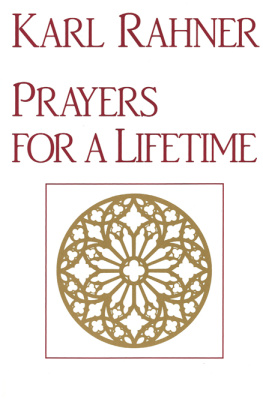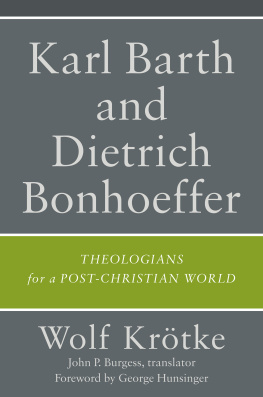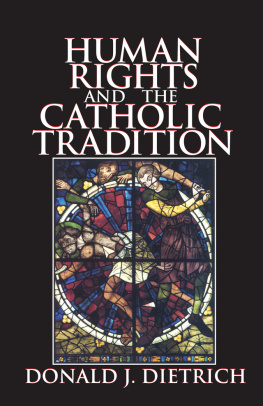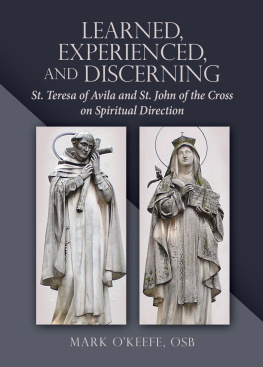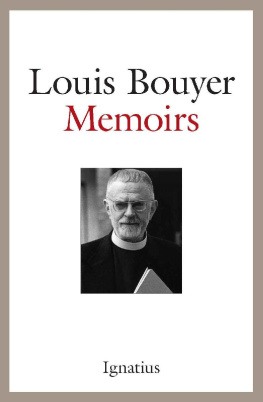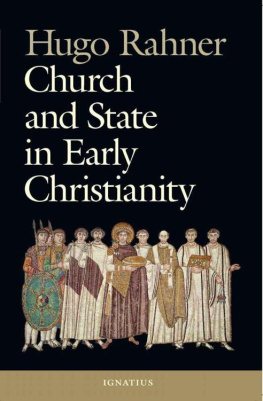Karl Rahner - Prayers for a Lifetime
Here you can read online Karl Rahner - Prayers for a Lifetime full text of the book (entire story) in english for free. Download pdf and epub, get meaning, cover and reviews about this ebook. year: 2021, publisher: The Crossroad Publishing Company, genre: Religion. Description of the work, (preface) as well as reviews are available. Best literature library LitArk.com created for fans of good reading and offers a wide selection of genres:
Romance novel
Science fiction
Adventure
Detective
Science
History
Home and family
Prose
Art
Politics
Computer
Non-fiction
Religion
Business
Children
Humor
Choose a favorite category and find really read worthwhile books. Enjoy immersion in the world of imagination, feel the emotions of the characters or learn something new for yourself, make an fascinating discovery.
- Book:Prayers for a Lifetime
- Author:
- Publisher:The Crossroad Publishing Company
- Genre:
- Year:2021
- Rating:4 / 5
- Favourites:Add to favourites
- Your mark:
- 80
- 1
- 2
- 3
- 4
- 5
Prayers for a Lifetime: summary, description and annotation
We offer to read an annotation, description, summary or preface (depends on what the author of the book "Prayers for a Lifetime" wrote himself). If you haven't found the necessary information about the book — write in the comments, we will try to find it.
Prayers for a Lifetime — read online for free the complete book (whole text) full work
Below is the text of the book, divided by pages. System saving the place of the last page read, allows you to conveniently read the book "Prayers for a Lifetime" online for free, without having to search again every time where you left off. Put a bookmark, and you can go to the page where you finished reading at any time.
Font size:
Interval:
Bookmark:

Karl Rahner
PRAYERS
FORA
LIFETIME
Edited by
Albert Raffelt
With an Introduction by
Karl Lehmann

A Herder and Herder Book
The Crossroad Publishing Company
New York
PRAYERS FOR A LIFETIME
An important topic in the theology of our time is the dichotomy that exists between its academic endeavors and the spirituality of the Christian faith. In his essay Theology and Holiness" (1948), which is still well known today and with good reason, Hans Urs von Balthasar sees this separation in the making ever since the High Middle Ages, and he pleads for a new unity. Traditional dogmatics appeared to be all bone without flesh; spiritual-ascetical literature seemed to many all flesh without bone. However, attempts have been repeatedly made in various quarters to overcome this division. One has only to think of the programs that were drafted in the 1930s and 1940s for a kneeling, a praying, and a kerygmatic theology (theology of proclamation).
In the interim, new developments have come to the fore, lending a different shape to systematic theology. The influences, for example, of personalist and existentialist philosophies as well as the biblical salvation-history approach have lifted the division between thinking and being, between theoretical reason and practical reason. Of course, a number of other causes continue to play a role in helping to overcome the estrangement of thought from life: the liturgical movement, the renewal based on the sources of Holy Scripture and the Church Fathers, and the return to the original conceptions of the great saints and the founders of religious orders.
Karl Rahner, together with other theologians, ranks among the pioneers who remained dissatisfied with the unfamiliarity with life of traditional theology. Despite their proximity in Innsbruck, Karl Rahner did not join the efforts of his fellow Jesuits on behalf of the theology of proclamation. Owing to his gifts as a philosopher, he could not accept the charge of bankruptcy leveled against the intellectual power of believing reason. The spirituality of Saint Ignatius Loyola (authentically imparted to him by his brother Hugo) and, simultaneously, the study of patristic theology opened up new paths for him. The anthologies Rechenschaft des Glaubens and The Practice of Faith (see the Afterword) provide ample evidence of this new point of view, which can also be demonstrated of E. Krebs, K. Adam, G. Shngen, E. Przywara, H. U. von Balthasar, H. de Lubac, and Y. Congar.
Sensitive areas in the relationship between theology and spirituality include instruction on praying and the practice of prayer. The great theologians were frequently great teachers of prayer as well. The names of Augustine, Thomas Aquinas, and Bonaventure prove this, as does a glance at Martin Luther, Karl Barth, and Dietrich Bonhoeffer. Therefore it seemed useful to view Rahners work in this way. The most important of his statements on the theology of prayer are available in the two anthologies already mentioned (see the Afterword for references). This third anthology devoted to Rahners thought was thus able to concentrate on examples of prayer itself.
Even in his early years it was clear that for Rahner prayer was hardly a secondary topic. Why We Need to Pray was the title of his first essay, written over sixty years ago while he was in his twenties. Alongside the exacting philosophical works Spirit in the World and Hearers of the Word stand the prayers, arising from a profoundly religious experience, of Encounters with Silence, his first book in fact. In 1949, writing under the pseudonym A. Trescher (his mothers maiden name), Rahner published a series of highly personal meditations entitled Heilige Stunde und Passionsandacht (appearing in English as Watch and Pray with Me). His reserve in publishing such deeply personal and revealing prayers is quite understandable. However, again and again, individual items saw publication. Frequently the Spiritual Exercises of Saint Ignatius served as inspiration, as in the case of Prayers for Meditation (written with Hugo Rahner), Spiritual Exercises, and Servants of the Lord, in addition to student days of recollection, Advent sermons, radio talks, and meditations delivered to various groups. During the 1970s, Rahners prayers, which had been scattered about and difficult to locate, began to appear again.
Karl Rahner possessed a broad understanding of prayer. Every significant experiencewhether of joy or of anguish points the way to the land of unbounded hope wherein God dwells. To the question Do you pray?" Rahner once replied: I hope that I pray. You see, whenever I actually notice, in all the big and little moments of my life, how close I am to that unutterable, holy, and loving mystery that we call God, and whenever I place myself there, dealing with this mystery, as it were, in confidence, hope, and love, whenever I accept this mystery, then I prayand I hope that I do. Prayer is thus a manifold witness to faith expressing itself through speech.
The reader will find in this anthology many prayers that grew out of certain definite situations and reveal characteristic expressions: the prayer of an ordinand on the eve of ordination, collective prayer during Benediction of the Blessed Sacrament, prayer in a sermon on Mary during May devotions, at Christmas, and so on. With great deliberation, Rahner derives the utmost from the seven last words of Jesus on the cross. He also recognizes the abiding significance of fixed formulas of prayer. So, for example, in a letter written in 1982 to a young person, he gives the following advice: As crazy as it may sound today, I would strongly recommend that you try reciting the rosary just once by yourself alone. Provided that one does not become impatient and that one tries to adjust to the practice slowly, show above all else that sometimes a stage can be reached in which deep personal concern and a heightened reflective character become predominant.
It is therefore no surprise that Rahners religious idiom changed over the course of almost fifty years. One can easily see, for example, how the transformation in his christological thinking is reflected in the various prayers addressed to Jesus. The reader can also detect glaring contrasts in Rahners experience of the Church by comparing the early prayer God of Law" with the much more recent, almost angry Prayer for the Church. In this way, the prayers of Karl Rahner clarify his path as a Christian, a Jesuit, and a theologian. This manylayered aspect of these prayers should not be ignored. There is always a cry from the depths, sometimes faint and restrained, but always provocative and straightforward. Prayers such as these exact a high price: quite often the language is that of a wounded spirit. Anyone who publishes prayers and doesnt bother to touch them up with literary polish is vulnerable to attack.
This collection of prayers will reveal to the reader the heart of Karl Rahners spirituality, but it can also disclose the intimate relationship between piety and theology in his thought. The virtually endless literature on Rahner has, with few exceptions, taken little notice of this. Yet without this added dimension, the distinctive character of Rahners theology would be severely misjudged. For in the end all abstract theology winds up in a vacuum if it cannot rise from mere words about a particular topic to prayer, wherein that which has previously only been spoken about may yet happen. It is in this spirit above all that Prayers for a Lifetime
Next pageFont size:
Interval:
Bookmark:
Similar books «Prayers for a Lifetime»
Look at similar books to Prayers for a Lifetime. We have selected literature similar in name and meaning in the hope of providing readers with more options to find new, interesting, not yet read works.
Discussion, reviews of the book Prayers for a Lifetime and just readers' own opinions. Leave your comments, write what you think about the work, its meaning or the main characters. Specify what exactly you liked and what you didn't like, and why you think so.

